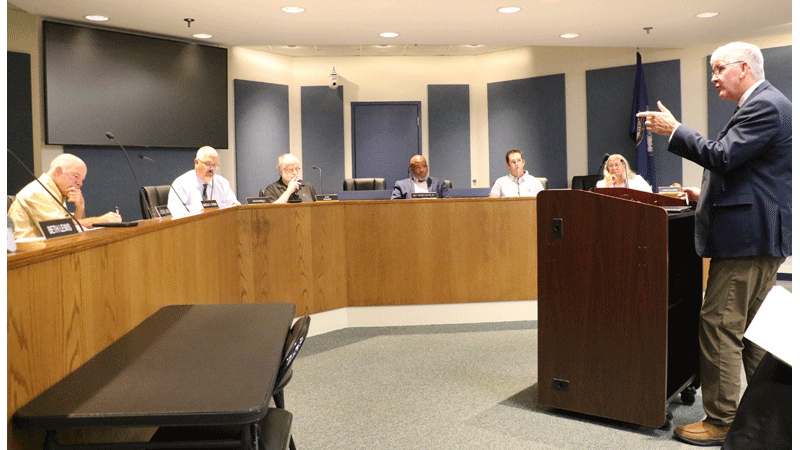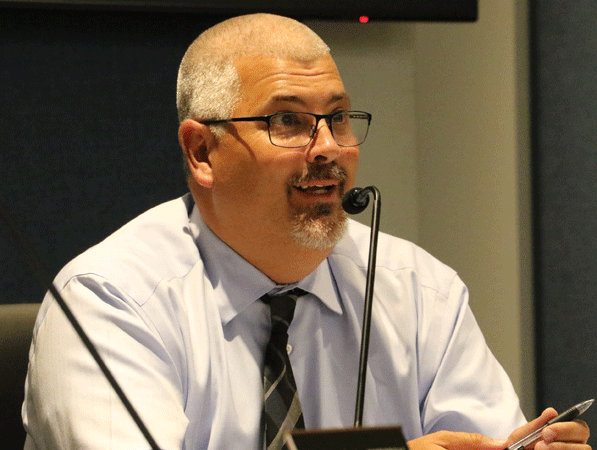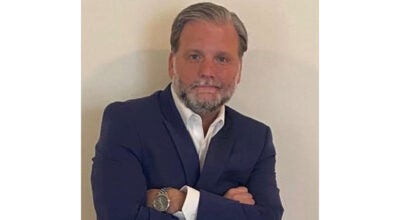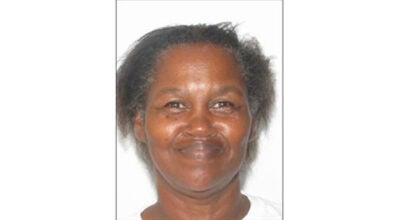Southampton County works to rebuild Litter Control Council
Published 9:03 pm Tuesday, August 16, 2022

- VDOT’s Jerry Kee, right, speaks to the Southampton County Planning Commission during the recent discussion on the county’s litter problem. (Photo by Titus Mohler)
|
Getting your Trinity Audio player ready...
|
The Southampton County Planning Commission and Board of Supervisors began work during the month of July to address the county’s litter problem.
At its July 14 meeting, the planning commission voted unanimously to reconstitute the county’s Litter Control Council, which Community Development Director Beth Lewis said had apparently not met since the COVID-19 pandemic began.
Jerusalem District Commissioner and Commission Vice Chair Jack T. Randall said it appears that the council has seven members appointed by the Board of Supervisors, one for each district. Then six members are appointed by the town councils within the county, which includes Boykins, Branchville, Capron, Courtland, Ivor and Newsoms.
He noted that the LCC also features six at-large members and six ex-officio.
Agreeing to reach out to the town councils about receiving their appointments were Lewis, at the commission’s July 14 meeting, and Southampton County Administrator Brian S. Thrower, at the board’s July 26 meeting.
The planning commission also voted unanimously to invite a representative of Chesterfield County to meet with the commission and the Litter Control Council, after it is re-formed, to share Chesterfield’s insights as a result of it having a successful litter control program.
At its July 26 meeting, the Board of Supervisors did not have appointees confirmed for all of the seven seats it appoints to the LCC, though some names were mentioned.
Newsoms District Supervisor Lynda T. Updike said she would like to reappoint Donna Taylor to the Newsoms seat on the council. Jerusalem District Supervisor and Board Chair Dr. Alan W. Edwards said that Heather Randall had already volunteered to be reappointed to the Jerusalem seat. Boykins District Supervisor Carl J. Faison said he would check with Charles Hood to see if he wanted to be reappointed to the Boykins-Branchville seat, and if not, he would find somebody else.
“So everybody pick somebody who is interested and willing to work, willing to get out there and pick up some trash themselves rather than supervising,” Edwards said. “So we’ll table that till next meeting and get that council straight.”
Thrower said, “As I put in your packet, I’d like to be involved with this group and try to help it reorganize itself and work with Ms. Lewis and the planning commission to try to get that group reconstituted and reorganized. So I look forward to working with that group.”
“Alright,” Edwards said. “Let’s see if we can get it all done by next meeting and get rolling.”
The July 14 litter discussion at the planning commission meeting included substantive input from Virginia Department of Transportation representative Jerry Kee, Southampton County Sheriff Josh A. Wyche Sr. and commission members.
The discussion came after the Board of Supervisors tasked the commission with solving the county’s litter problem.

Jerusalem District Commissioner and Commission Vice Chair Jack T. Randall contributes to the discussion addressing the county’s litter issues during the Southampton County Planning Commission meeting on July 14. (Photo by Titus Mohler)
Randall helped open the discussion by affirming that it was an important one to have.
“Today and the last couple of weeks, I’ve been talking to folks about the litter council, because anybody that goes down (U.S. Route) 58 through our business district — it’s litter everywhere,” he said. “I don’t think anybody can dispute that. And we have a litter problem in Southampton County.”
He emphasized the importance of the Litter Control Council in the effort to clean up the county.
“It’s very imperative that the right folks that are going to participate are placed on this specific council,” he said.
Kee mentioned that in the past, he has been the person representing VDOT on the LCC.
“The council had a lot of good ideas, but a lot of them didn’t come to fruition, and I think that’s the issue — you have to have people that are going to be driven to do it,” he said.
“Participators, not pontificators,” Randall said.
“Exactly,” Kee replied. “Somebody that’s got an idea but doesn’t want to fulfill it, that was the issue last time.”
“That’s what I got from people calling me — ‘Just make sure (that) in the selection process you get the head of some of the groups where they can get other folks to participate actively,’” Randall said. “That was one message that was pretty clear to me.”
Berlin-Ivor District Commissioner Douglas A. Chesson said the county should make clear what its expectations are going to be of the appointees to the re-formed Litter Control Council.
“And if the expectation is that they’re out picking up trash three or four times a year as a member of the Litter Control Council, they need to know that as well,” Lewis said.
At-Large Commissioner Lynette Allston pointed to the LCC as the group that should be responsible for a marketing campaign that gets county residents energized to help out with combating litter.
Multiple commissioners noted how clubs and civic organizations can be recruited and could provide valuable assistance in the effort.
“Sometimes all you have to do is ask and put the right pieces in place, but I think everybody is pretty consistent of wanting to help here, so that’s the good news,” Randall said.
“Now if you have spots that are really bad, bad spots, I can send my guys out there to do it,” Kee said, in reference to VDOT workers, “but I’d rather not send my guys to do it. I’d rather have them doing other stuff. But I have done that before.”
Kee also noted that VDOT can put “No Littering” signs up, but the Code of Virginia does not allow it to put fine amounts on those signs.
Wyche said his encouragement to citizens is that when they see people littering, they should say something to his office.
“Let us know about it,” he said. “Don’t try to take it upon yourself to be stopping these people and letting them know about that trash because you could be running up on more than what you want to handle. … Nobody is going to throw trash out when a police car is around — nobody is going to throw it out. So when we see it, we’re going to take care of it. Even at the dump sites, if we see trash out there, which I’m going to get more proactive as far as when you go by the dump sites to start looking and see if you see the trash out there so we can handle it versus the board handling it.”
He mentioned the possibility of his office finding the people responsible and bringing them back to clean up the litter without having to involve the court system.
Edwards, who also sits on the commission, said, “Sheriff, if I’m riding down the road and see somebody throw out some trash, what’s the best thing I can do?”
“The best thing you can do is when you see them throw out the trash, if you can get us a tag number, maybe we can find out who it is through that tag number,” Wyche said. “If you see it, call us, let us know, and then we’ll try to address the issue.”
Wyche noted that “it’s going to take all of us to get this job done.”





